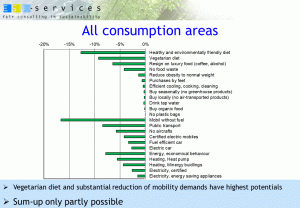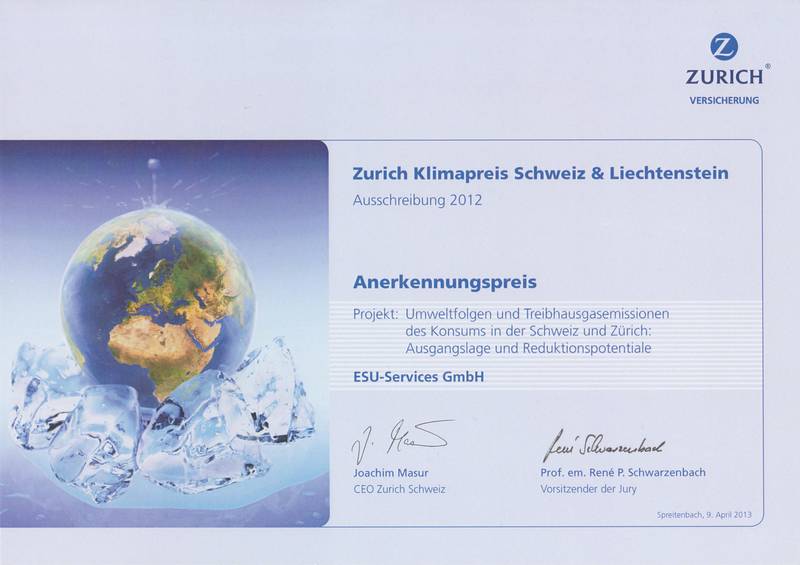The way of living is an important driver for environmental impacts
Life Cycle Assessment is an important tool to address the environmental impacts of personal life cycles and pave the way towards more sustainable consumption.
To promote environmental awareness among consumers, however, a holistic view of consumption is required. This makes it possible to identify particularly relevant aspects of our lifestyle and to promote an efficient and effective reduction of environmental pollution at the individual level. This also enables individuals to make a valuable contribution to achieving sustainability goals alongside business and politics.
Niels Jungbluth, CEO of ESU-services, wrote his dissertation on the project “Energy, Greenhouse Gases and Lifestyles” in 1996-2000. Since then, various studies and calculations on this topic have been developed at ESU-services. We have created the data basis for various footprint calculators such as the ECO2 Privat-calculator, the footprint calculator of WWF Switzerland and the climate calculator of WWF Germany. Further ideas for climate-friendly lifestyles were developed in an article for FOEN magazine. This is also an issue within the project “Wir leben 2000 Watt” (We are living 2000 Watt) which is being carried out for the city of Zurich. A new methodology has been developed which allows the estimation of the potential of certain changes in consumer behavior on the total environmental impacts caused in Switzerland. This allows setting priorities for political decisions. The focus is laid on the most important consumption areas: nutrition, energy use and mobility. Sustainable consumption patterns were also the topic of the Swiss LCA discussion forum No. 49 in September 2012 which was organised by ESU.
Potential reduction of environmental impacts

Households and private persons play a key role for achieving targets for a Green Economy as part of Sustainable Development. Within a study, levels of environmental impacts caused in Switzerland have been evaluated (8250 Watt, 12.8 tonnes of greenhouse gas emissions, 20 million eco-points per capita). More than half of environmental impacts are caused in the three consumption areas of mobility, housing (energy demands) and nutrition. In a next step, reduction potentials for these environmental impacts were evaluated. The highest potentials are found for the consumption of food products by following recommendations for a healthy and environmentally friendly diet (less meat, products from organic production, no food brought by air, less luxury food and wastage). Energy conscious behaviour in household and traffic as well as using eco-friendly energy carriers and means of transportation is especially important for the reduction of energy demand and greenhouse gas emissions. The analytical tools developed in this research work can be used in follow-up assessments for monitoring the environmental impacts of consumption patterns and campaigns for changing behaviour.
Regional adaptation of reduction potentials
The reduction potentials investigated from a Swiss perspective have been adapted in a follow-up study for the specific situation in the City of Zurich. A first analysis pointed out the principle differences between investigating environmental impacts of consumption and calculating the cumulative energy demand and greenhouse gas emissions according to the methodology used by the 2000-Watt-society. The main goal was to highlight system boundaries, environmental indicators, relevant consumption areas and the database for the present situation in Zurich. People in the City of Zurich drive fewer kilometres by car and use more environmentally friendly electricity and heating mixes. Thus, environmental impacts caused by them are slightly lower compared to the average Swiss households. Nevertheless, the total impacts of consumption are higher than calculated so far according to the 2000-Watt-methodology.

The research project forms the further basis for planning appropriate measures to reduce the environmental impacts caused by households in Zurich. The studies on reduction potentials were recognized at the Zurich Climate Prize 2013.
Selected publications
Christoph Meili, Niels Jungbluth (2018) How WWF Switzerland and WWF Germany improved their consumer awareness campaigns by using LCA-Thinking and an improved environmental footprint calculator. Forum for Sustainability through Life Cycle Innovation e.V., Life Cycle Innovation Conference 2018 (LCIC), Berlin, 30.08.2018
Kissling-Näf I., Bernath K., Seyler C., Fussen D., Jungbluth N. and Stucki M. (2013) RessourcenEFFizienz Schweiz REFF: Grundlagenbericht zur Ressourceneffizienz und Rohstoffnutzung. Ernst Basler+ Partner AG und ESU-services GmbH im Auftrag Bundesamt für Umwelt (BAFU), Abteilung Abfall und Rohstoffe, Bern.
Jungbluth N., Flury K. and Doublet G. (2013) Environmental impacts of food consumption and its reduction potentials. Short paper. In proceedings from: 6th International Conference on Life Cycle Management, Gothenburg
Niels Jungbluth, René Itten, Salome Schori (2012) Environmental impacts of food consumption and its reduction potentials. 8th international conference on Life Cycle Assessment in the Agri-Food Sector, “LCA Food 2012”, Saint-Malo, France, 1-4 October 2012 (Conference Paper)
Niels Jungbluth, Rene Itten, Matthias Stucki: Environmental impacts of consumption patterns in Switzerland and reduction potentials. 49th LCA Discussion Forum “Sustainable Consumption Patterns” 18. September 2012, ETH Zurich
René Itten, Niels Jungbluth: A questionnaire for calculating ecological footprint. 49th LCA Discussion Forum “Sustainable Consumption Patterns” 18. September 2012, ETH Zurich
Jungbluth N., Itten R. and Stucki M. (2012) Umweltbelastungen des privaten Konsums und Reduktionspotenziale. ESU-services Ltd. im Auftrag des BAFU, Uster, CH
Jungbluth N. and Itten R. (2012) Umweltbelastungen des Konsums in der Schweiz und in der Stadt Zürich: Grundlagendaten und Reduktionspotenziale. ESU-services GmbH im Auftrag der Energieforschung Stadt Zürich, Zürich.
Jungbluth N., Nathani C., Stucki M., Leuenberger M. 2011: Environmental Impacts of Swiss Consumption and Production. A combination of input-output analysis with life cycle assessment. Federal Office for the Environment, Bern. Environmental studies no. 1111: 171 pp.
Jungbluth N., Frischknecht R. and Faist Emmenegger M. (2001) Database Footprint Calculator Switzerland. ESU-services im Auftrag des WWF Schweiz, Uster